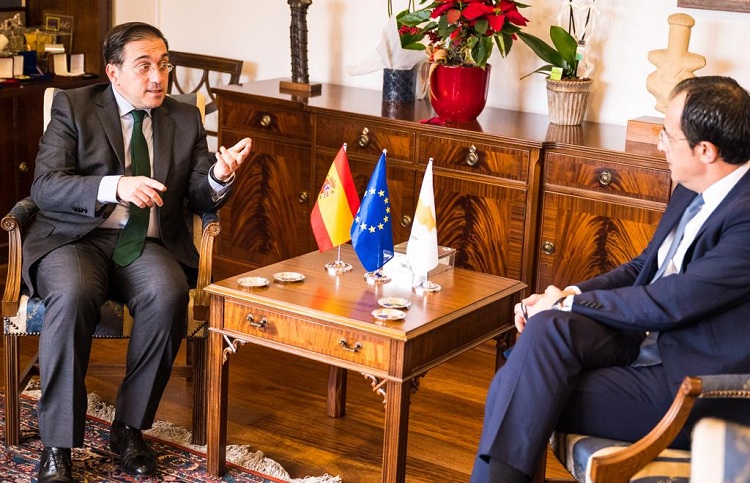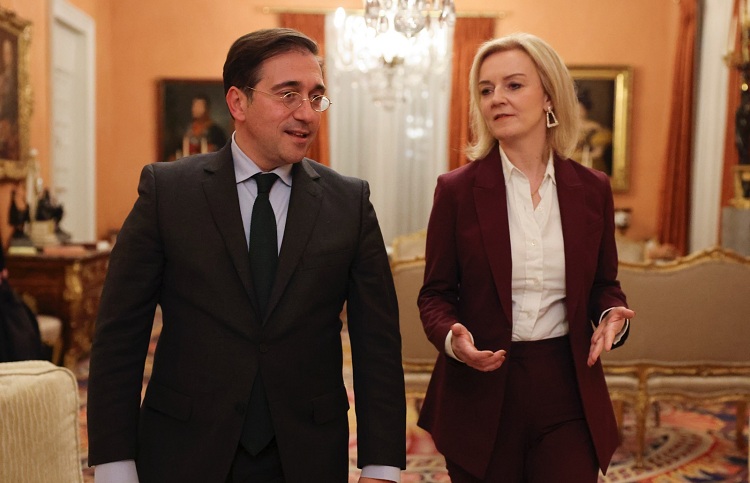The Diplomat
Foreign Minister José Manuel Albares was received yesterday in Nicosia by his Cypriot counterpart, Nikos Christodoulides, on the second leg of his tour of Greece and Cyprus in an attempt to defuse the unrest generated by the recent Spain-Turkey Summit.
“Delighted to welcome my Spanish colleague, Jose Manuel Albares, in Cyprus to continue the open talks we had in Spain last week,” Christodoulides wrote on his Twitter account. “As like-minded countries of Southern Europe, united by strong ties of friendship and converging interests, both Cyprus and Spain will benefit from further cooperation,” he added.
In the same tone, Albares wrote on the same social network that at the meeting he had “noted” the “good relations between Cyprus and Spain” and assured that the two had strengthened the “bilateral, Mediterranean and European dialogue.” Later, the minister visited the UN Peace Mission in Cyprus and congratulated the head of the Mission, Colin Stewart, on his recent appointment. “He has the support of Spain in his work and I wish him success in his mission,” he added on his Twitter account.
Apart from the usual good words, neither government has provided further details about the meeting between the two ministers. While foreign sources consulted by The Diplomat have limited themselves to referring to the contents of the tweets, Cypriot diplomatic sources assured Cyprus News Agency (CNA), Cyprus’ main press agency, that the message of the meeting was “clear”: the two countries strongly believe in the need to improve bilateral cooperation and coordination because it would benefit both Cyprus and Spain, “especially on issues of mutual interest on the European agenda, such as EU relations with third countries, including Turkey,” in addition to other issues, such as the migration crisis, the Mediterranean or cooperation with the UK in the post-Brexit era.
Coming from Greece
Both ministers already met last week in Madrid on the occasion of the official visit to Spain of the President of Cyprus, Nikos Anastasiadis, who agreed on a joint statement with the President of the Government, Pedro Sánchez, in which both reaffirmed their “strong support for a comprehensive and viable solution to the Cyprus issue, based on a bicommunal and bizonal federation with political equality, as established by UN resolutions and in line with EU principles.”
Apart from that, Albares arrived yesterday in Nicosia from Athens, where he was received by the Greek Minister of Foreign Affairs, Nikos Dendias, who, in an appearance without questions to the press, warned that “since 2008, the EU Member States are committed not to export military equipment that can be used against a Member State” and therefore, had conveyed to the Spanish Minister the “concern” of Greece for “the possible intention of Spain to strengthen its military cooperation with Turkey”. For his part, Albares limited himself to assuring that “Spain is very clear in its support for constructive dialogue between Greece and Turkey and the search for solutions in accordance with international law”.
The background to Albares’ tour of Greece and Cyprus is the unease generated by the recent summit between Spain and Turkey, during which the Turkish President, Recep Tayip Erdogan, assured that his country is interested in acquiring a second aircraft carrier and a series of submarines for its Navy in collaboration with Navantia, which is already helping the Turks in the construction of a smaller aircraft carrier. The fear of Greece and Cyprus is that these words of Erdogan respond to the intention of Spain and Turkey to sign a Defense Treaty. Diplomatic sources assured that one of the objectives of Albares’ current tour was to deny these reports.
Greeks and Cypriots maintain a tense neighborly relationship with Turkey, which has recently been aggravated by gas exploration in the Eastern Mediterranean, and consider it a kind of betrayal that Spain, a partner country in the European Union, has such close ties in military matters with a government like that of Ankara. The other major sticking point is the “Cyprus question”. The country has been divided since 1974 between a self-proclaimed Turkish Republic of Northern Cyprus, recognized only by Ankara, and the Republic of Cyprus, a mainly Greek-Cypriot entity, with its capital in Nicosia, which is internationally recognized and is even a member state of the EU.







